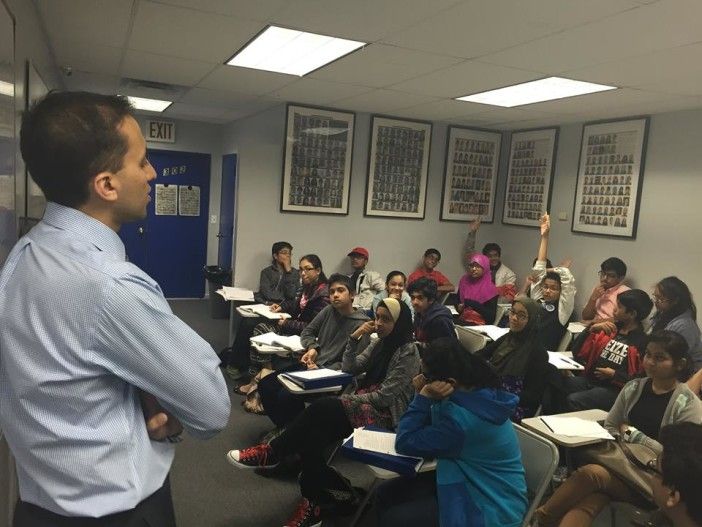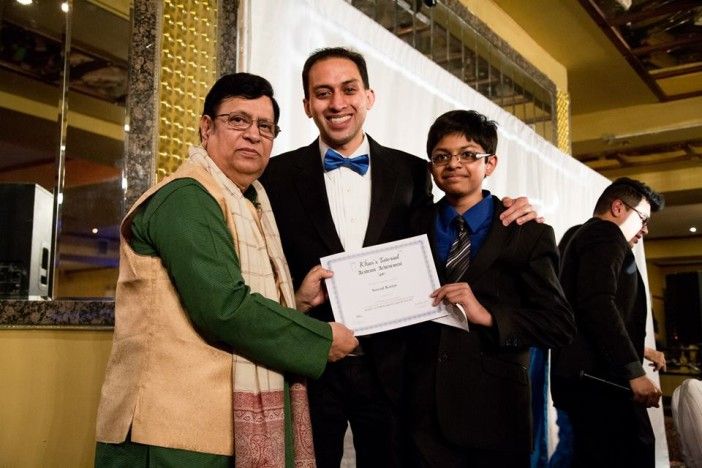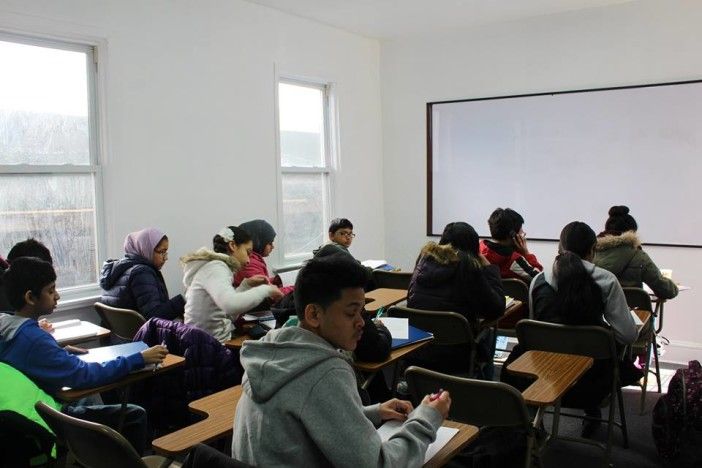Khan’s Tutorial On The Importance, And Struggles, Of Helping Students In Need


How hard is it to give something away for free in the New York City public school system? When local tutoring company Khan’s Tutorial (188 Dahill Road) wanted to provide its services to several students in need through a scholarship program, they found a lot of unexpected hurdles, and it’s something they hope can change in the future.
In advance of Comptroller Scott Stringer’s Red Tape Commission, which will provide business owners with a forum to discuss the issues they butt up against in dealing with city agencies and regulations, we asked Dr. Ivan Khan, president and CEO of Khan’s Tutorial, what his experiences have been, and what he’d like to see changed.
KBK: Tell us a bit about your business — what’s your background in teaching and tutoring, and how did you come to be a part of the tutoring academy that was originally started by your father?
Dr. Ivan Khan: Khan’s Tutorial is a tutoring and mentorship academy with 10 locations in New York City’s outer boroughs. Since 1994, our mission has been to bring high-quality tutoring to low-income communities at a very low cost. Our work has helped over 1,879 students gain admissions to NYC’s specialized high schools and hundreds score perfectly on their citywide/Common Core standards, while helping countless get into some of the nation’s top colleges with generous scholarship.
I started tutoring during my senior year at Bronx Science in 1998. I became involved in the management of Khan’s Tutorial in 2002, during my third year at the Sophie Davis medical program. Though my academic background is in medicine and public health (SUNY Downstate classes of 2007 and 2009) I have been leading Khan’s operations since 2002. I became full time in 2011 when the company was growing beyond a weekend side business into a full-time responsibility. Also, my father’s 12-year battle with bone marrow cancer was a key component in me spending a lot of extra time at Khan’s Tutorial away from my medical education/career.
I understand you recently decided to offer scholarships to certain students — can you explain why, what these were to offer, and to whom?
In spring 2014, Khan’s Tutorial launched its opportunity scholarship program. Khan’s dedicated two seats at every one of our locations to a 6th grader to get 18 months of free SHSAT tutoring, and six months of fully covered SHSAT tutoring for a 7th grader. This program was made available to top-performing African American and Hispanic students due to the under-representation of these groups at Stuyvesant HS and at Bronx Science.
We wanted to exhibit that under-awareness of the schools and prep programs in general were contributing to the low numbers of blacks and Hispanics at Stuyvesant. By launching the opportunity scholarship, we wanted to prove that under-represented minorities could do just as well as other groups as long as the resources were made available to them.
In the search for students qualified for these scholarships, it sounds like you encountered some difficulties while dealing with individual schools — what were some issues you encountered?
After visiting anywhere from 15-20 schools in person, our outreach teams at Khan’s were often asked to return at another time, or schools flat out declined to participate. If the schools weren’t flat out refusing to participate in the program, we were asked to leave copies and told that the school leaders would be distributing the paper applications to eligible students.
For many schools, they did not pass the applications out or make any effort to encourage students to apply, which became evident when we had zero applications from those very schools.
Very few school officials, if ever, responded via email. It made us wonder whether school officials regularly check their official emails which are listed on many school websites.
The biggest realization was that the DOE doesn’t have a designated staff member in charge of working with DOE vendors, or even a staff person that is assigned to considering collaborative partnerships. It’s different for every school, and quite often, school administrators themselves are unsure of who the final person to make that choice is. Many schools defer to the principal to make that choice, however it’s been close to impossible to have any principal sit with us during our visits or schedule us in for a follow-up appointment.

How do you think the city could help your business with issues like that in the future?
The city can start by having a designated staff person at the DOE whose job it is to field potential collaborative partnerships. Just because a company is private shouldn’t eliminate them from having a conversation in which a free scholarship is being handed out.
Also, do schools share information via email blast or letters home? School leaders can do more to keep parents up to speed on free resources in their community for eligible students.
Do you feel like there have been — or will be — any specific regulatory obstacles that have gotten or could get in the way of your business’ growth?
Yes, right now, Mayor de Blasio along with the UFT is spearheading a change to the admissions criteria to NYC’s specialized high schools. Despite there being no evidence to support their proposed changes, the city is trying to change the admissions criteria away from the single entrance exam to a more holistic approach, to help increase the number of African Americans and Hispanics at three specialized high schools. The evidence at Staten Island Technical high school has proven that moving away from a holistic admissions criteria to a single test only helped increase black and Hispanic students at Staten Island Tech. Holistic admissions has mainly proven to help whites and more affluent families. Many Asian New Yorkers feel targeted that the rules are being changed only after many Asian communities found success in the current admissions process that has been effective for decades in recruiting in the most merit-based, objective way.
What’s one of the most important things you’ve learned in your many years in this business?
One of the most important things that I’ve learned is that if you want to create change for the better, often times you can’t depend on a school system that is as large as New York City’s. NYC’s public school system is technically as large as many major U.S. cities in entire population, and many school leaders are inadequately trained in collaborative partnerships and how to approach them.
Collaborative approaches decreased the burden on any single entity to find the best solution. Though Khan’s is ready to do much of the heavy lifting on paying for the seats and scholarships, we can’t achieve our goal without the recruitment support of school leaders to help us identify the top students that can be helped the most.
That’s a lot of questions about “worst” and “challenging” issues — what’s been the best thing about running a tutoring academy in New York City?
The best thing about running a tutoring academy in the city is having the ability to fill the gaps for so many low-income students. It’s pretty well known that there is a massive amount of inequality within our public school system, especially for younger age groups, low-income populations, minorities, and new immigrants.
Having been through the public school system myself, I remember the difference in school culture, having attended local zoned schools in Elmhurst and South Ozone Park, to an upper-middle-class junior high school in Douglaston, Queens, to high school at Bronx Science. Poorer schools and their leaders need as much support as possible to give them a fighting chance in today’s fast-paced environment. Many times, school leaders feel too unsupported to be able to properly inspire their own students.
Even if we are able to meet with students and families for 1-2 sessions on the weekends, we are able to not only tutor, but help families navigate a system that quite often leaves their poorest members behind.

Your business has locations around the city, including one in Kensington — and, as you were once a Kensington resident, are there any favorite businesses that you like to visit nearby? Anyplace where you’re a regular?
I had been a Kensington resident from 2004-2007. I lived on the corner of Ocean Parkway/Prospect Expressway and Church Ave. My favorite place in Kensington was the Thai restaurant on the corner of McDonald Ave and Albemarle Road [Am Thai — this location has closed, but they’re still open on Church Avenue]. Besides getting regular take-out from there, I once hosted a New Year’s party and catered food from there and it was a runaway hit! Besides the Thai restaurant, I enjoyed all of the neighborhood small businesses located along Church Ave between McDonald Avenue to Ocean Parkway. From small flower stores to older hardware stores to the local laundromat, I was a regular there as well as Yummy Taco and local Asian takeout places.
Is there anything else you’d like neighbors to know?
Whenever I tell New Yorkers and even Brooklynites about my time living in Kensington, or about our Khan’s location in the neighborhood, I often still get confused looks. People seem to mainly recognize the neighborhood if I bring up, “Oh it’s near the Pavilion movie theater in Park Slope,” or say it’s just a few minutes away from Prospect Park. Though it frustrated me, I was quietly happy that my old neighborhood didn’t have to suffer a drastic increase in rent the same way many other neighborhoods in Brooklyn did. If there is ever a way to keep improving Kensington, without changing the community feel of the neighborhood, I’m all for it!
Are you a business owner dealing with a lot of red tape? Comptroller Scott Stringer’s Red Tape Commission will take place on Friday, October 16 from 8:30-10am at Brooklyn Law School (Geraldo’s Cafe, Feil Hall, 1st floor) at 205 State Street in Downtown Brooklyn. All NYC business owners are welcome to attend — if you’re a business owner who would like to submit written testimony or comments, send them to redtape@comptroller.nyc.gov.




